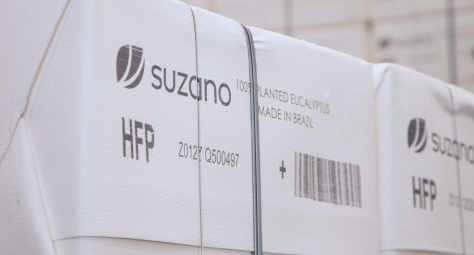sobre o que você deseja falar?


perguntas, sugestões ou problemas técnicos envolvendo a plataforma

informações sobre a empresa




Dimensão SASB
Product Lifecycle ManagementCódigo SASB
RT-CP-410a.3Setor SASB
Containers and PackagingDimensão GRI
Material TopicsCódigo GRI
3-3Suzano constantly seeks to develop bioproducts with the lowest possible impact, offering solutions to society's challenges. To this end, we carry out Life Cycle Assessment studies (LCA, according to ABNT NBR ISO 14040) to measure products' environmental performance and improve environmental processes.
Internationally recognized, LCA promotes the careful assessment of the potential impact of the different items in our portfolio, considering the entire production process, from the extraction of raw materials to, possibly, the product's final destination. The methodology assesses different categories of impact on the ecosystem (water, soil, and air) and the health of living beings. These are water depletion, land use, abiotic depletion (fossil fuels, minerals), acidification, ecotoxicity, eutrophication, global warming, ozone depletion, photochemical ozone formation, and human toxicity.
We currently have extensive coverage of the product portfolio with LCA studies, adhering to the quality requirements of ABNT NBR ISO 14040/14044. We plan to significantly increase this coverage and ISO 14067 for the upcoming year.
We have developed LCA studies for the following items in our portfolio, as well as other studies in progress:
From this, we aim to identify opportunities for improvement along the chain and establish action plans to reduce, for example, the carbon footprint of the items in the portfolio, such as reducing fossil fuels at all stages of production, among other opportunities, together with the different links in the value chain.
Circular economy
The concept of a circular economy is central to Suzano's business model and long-term vision. As one of the world's largest producers of bio-based renewable materials, we specialize in pulp, paper packaging, and fluff. We also explore new business opportunities that utilize eucalyptus biomass, including lignin, bio-oil, and microfibrillated cellulose (MFC). By focusing on renewable resources and natural cycles, Suzano aligns itself with the principles of a circular economy, where materials are continuously reused, and waste is minimized throughout the supply chain.
Two examples of circular economy at Suzano are:
As a company focused on renewable resources, we associate closing the loop with the biological route, which is inherently regenerative and waste-free. This means that the components of our products can return to natural biological cycles through biodegradation processes. Additionally, through the technical route, we actively shape the recycling chain. We participate in forums for the sector, such as the Brazilian Tree Industry (Ibá), and engage with the government, recognizing that this is an essential aspect of our efforts. However, it is not the only one.
Life Cycle Assessment (LCA) is utilized to evaluate potential circularity alternatives. It's important to note that a solution aimed at closing the loop does not always guarantee optimal environmental performance. In other words, simply addressing the issue of solid waste may not be sufficient if it leads to processes that require more natural resources or result in higher greenhouse gas (GHG) emissions.
Pulp
Life cycle analyses (LCAs) are a critical component of portfolio management in the pulp business unit. Throughout 2024, we updated the LCAs for all production units following ISO 14040/14044 and ISO 14067 standards. The results underwent third-party verification by KPMG, who also contributed to refining the assumptions used in the studies.
Furthermore, research studies have been conducted in collaboration with academia and its stakeholders, supported by R&D. Finally, we executed four LCA projects with the market in Europe and Asia.
Eucafluff®
In 2024, we conducted an updated life cycle study of Eucafluff®, comparing it to pine fluff produced in the southeastern United States¹. Thanks to the advanced technology implemented in Suzano's eucalyptus plantations, we can make more fluff on less land, consume fewer natural resources, and reduce the environmental impact throughout the production chain².
Paper and Packaging
The Life Cycle Assessment (LCA) was utilized to measure the environmental impacts of medicine packaging. This initiative, which was first conducted in 2023, will continue into 2024. The carbon emissions generated from production will be offset using carbon credits from Suzano. This ongoing effort underscores the commitment to mitigating the environmental impacts of operations, promoting sustainability, and supporting projects that advocate responsible environmental practices.
Based on the new Pulp LCA studies completed in 2024, the paper unit will update its LCAs in 2025. This process will cover its entire product portfolio and undergo a third-party review.
New bio-businesses
In our New Bionegócios Unit, we incorporate Life Cycle Assessment (LCA) from the initial development phase to identify critical points related to environmental impacts. We adopt an eco-design approach, which involves mapping and integrating alternative processes and technologies whenever possible to reduce the effects throughout the product's life cycle while designing new products and their applications.
In this context, we want to emphasize the development of innovative biosolutions such as Ecolig®, a technical kraft lignin derived from eucalyptus, and Biofiber, microfibrillated pulp (MFC). These materials possess multifunctional characteristics that aim to reduce our reliance on non-renewable resources. Additionally, they can help decrease the carbon footprint of products that include them in their formulations.
These solutions contribute to sustainability and circularity within their respective value chains and possess unique properties that optimize resources and enhance process efficiency. This aligns with our environmental commitments and sustainable development strategies. For Ecolig, we have initiated the Environmental Product Declaration (EPD) study, which analyzes a product's environmental performance and requires a Life Cycle Assessment (LCA) to be conducted. The launch is scheduled for May 2025.
LCA WG
We have a Life Cycle Analysis Working Group (LCA WG), which includes the different business units: UNC, Consumer Goods Business Unit (UNBC), Paper and Packaging Business Unit (UNPE), New Business, Eco-efficiency, Fluff and Climate Change.
In this forum, the various demands of the business units were presented to share experiences and debate the search for best practices and more efficient project execution.
The lessons learned in 2024 at the pulp unit regarding the Life Cycle Assessment (LCA) were shared with the paper and packaging unit and during the lignin Environmental Product Declaration (EPD) development. Additionally, experiences gained from participating in various forums, such as the circular economy forum, and insights from relevant courses were shared. This included discussions and presentations on different methodologies, including the Social LCA.
The group was also used to collect information and data to meet indexes such as the CDP. In addition, throughout the year, each business unit published LCA knowledge pills highlighting its achievements.
The following table shows data since 2020 on the percentage of the company's product portfolio that has LCA.
Notes:
| 2020 | 2021 | 2022 | 2023 | 2024² | |
|---|---|---|---|---|---|
| % | % | % | % | % | |
|
Percentage |
49,00% |
50,00% |
88,51% |
86,40% |
82,20% |